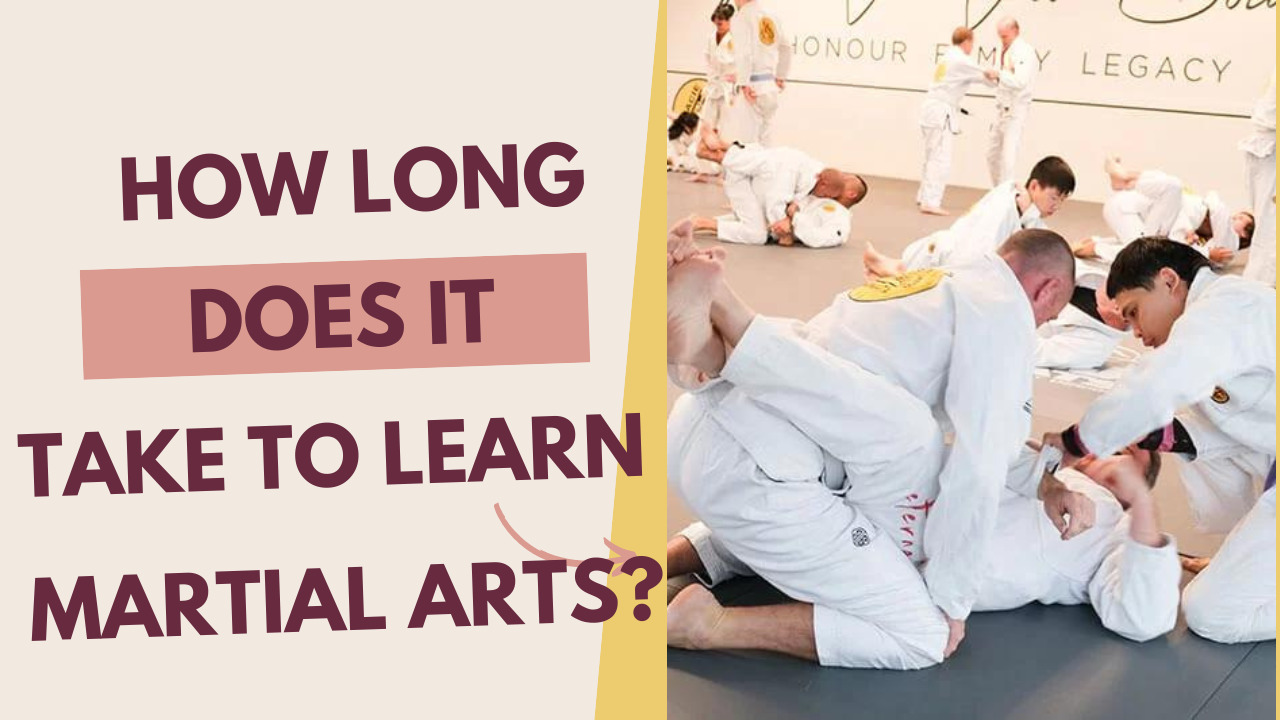Learning martial arts is a journey that demands dedication, discipline, and perseverance. The question of how long it takes to master this art form is complex, influenced by various factors such as the specific martial art, individual abilities, consistent practice, and the level of proficiency one seeks.
Understanding the realistic timeframes for progression, from beginner to advanced stages, is crucial in managing expectations. While some may achieve proficiency in a relatively short time, the pursuit of mastery is often a lifelong endeavor.
This introduction aims to explore the nuanced aspects of learning martial arts, offering insights into the timeframes, training intensity, and the importance of setting realistic learning goals for those venturing into this ancient discipline.
Factors Affecting Learning Time
Factors affecting learning time in martial arts vary depending on an individual’s commitment, natural ability, and the frequency of training. The rate at which a person progresses in martial arts is highly individualized. Some learners may grasp techniques quickly due to their natural athleticism and previous experience in related disciplines, while others may require more time to develop the necessary skills.
Additionally, the frequency of training plays a crucial role in one’s learning curve. Consistent and regular practice allows individuals to reinforce their knowledge and muscle memory, leading to more rapid progress. Those who train infrequently may find that their skills plateau or regress between sessions, prolonging the time it takes to master martial arts techniques.
Moreover, individual progress in martial arts is influenced by various factors, such as dedication, discipline, and the ability to adapt to new concepts. While some may excel through sheer determination and relentless practice, others may struggle to maintain the same level of commitment, thereby affecting their learning pace.
Ultimately, the time it takes to learn martial arts is contingent on the unique combination of these factors as they manifest in each practitioner’s journey.
Beginner Expectations Vs. Reality
Upon beginning their martial arts journey, beginners often anticipate rapid progress and mastery of techniques, but the reality is that learning martial arts requires a significant investment of time and dedication. Many beginners expect to see immediate results and may feel discouraged when progress seems slow. It’s important for aspiring martial artists to understand that improvement in martial arts is a gradual process and that setting realistic expectations is crucial for long-term success.
One way to manage expectations is through progress tracking. Beginners should be encouraged to keep a training journal or utilize technology to monitor their development over time. By documenting their training sessions, techniques learned, and personal achievements, beginners can gain a clearer understanding of their progress, even when it may feel slow. Progress tracking can also help individuals recognize and celebrate their improvements, regardless of how small they may seem.
Understanding the gap between expectations and reality can help beginners stay motivated and committed to their martial arts journey. It’s essential to embrace the learning process and acknowledge that progress, no matter how incremental, is a testament to dedication and hard work.
Timeframes for Different Martial Arts
The proficiency level one achieves in different martial arts disciplines varies significantly based on the style, individual aptitude, and consistent practice. Different martial arts have varying timeframes for mastering the techniques and philosophy.
Here are the general timeframes for achieving proficiency in different martial arts:
-
Karate: It typically takes around 3 to 5 years to attain a black belt in karate, depending on the frequency of training and the individual’s physical conditioning.
-
Brazilian Jiu-Jitsu: Mastery in Brazilian Jiu-Jitsu often requires 8 to 12 years of dedicated practice, as it involves intricate ground techniques and mental discipline.
-
Taekwondo: In general, it takes approximately 3 to 5 years to reach a black belt in Taekwondo, with a strong emphasis on physical conditioning and mental discipline.
-
Kung Fu: Mastering Kung Fu can take anywhere from 5 to 10 years due to its extensive catalog of techniques and the focus on mental discipline and physical conditioning.
-
Muay Thai: Becoming proficient in Muay Thai usually takes around 4 to 6 years, as it involves rigorous physical conditioning and mental discipline to excel in the art of eight limbs.
Intensive Training and Accelerated Learning
How quickly can one progress in mastering martial arts through intensive training and accelerated learning?
Accelerated progress in martial arts can be achieved through focused training and dedicated practice. Intensive training involves concentrated and rigorous sessions that aim to maximize skill development in a shorter timeframe. By focusing on specific techniques, forms, and principles, students can make significant strides in their martial arts journey.
Accelerated learning techniques such as visualization, mental rehearsal, and targeted drills can also expedite skill acquisition. These methods help practitioners enhance their muscle memory, reflexes, and overall proficiency in a more efficient manner.
Additionally, personalized coaching and individualized training plans can further boost progress. Tailoring training programs to address an individual’s strengths and weaknesses can lead to accelerated growth. Furthermore, integrating cross-training and supplementary exercises can enhance physical conditioning, agility, and overall performance, contributing to accelerated learning in martial arts.
It is important to note that while intensive training and accelerated learning can expedite progress, consistency and dedication remain fundamental to achieving mastery in martial arts.
Mastery and Lifelong Learning
Achieving mastery in martial arts requires continuous skill refinement and a commitment to improvement.
Lifelong learning is a fundamental aspect of martial arts, as practitioners constantly seek to deepen their understanding and hone their techniques.
The pursuit of mastery is a journey that demands dedication, perseverance, and a willingness to embrace new challenges.
Continuous Skill Refinement
Continuous improvement in martial arts involves the ongoing refinement of skills through mastery and lifelong learning.
Skill progression is a key component of continuous improvement in martial arts. As practitioners advance, they refine their techniques, deepen their understanding of the art, and develop a more profound connection between body and mind.
Muscle memory plays a vital role in continuous skill refinement, as consistent practice engrains movements and techniques into the subconscious, allowing for more fluid and instinctive execution.
Additionally, seeking guidance from experienced mentors and instructors fosters continuous skill refinement by providing valuable insights and feedback.
Engaging in cross-training across different martial arts disciplines can expand a practitioner’s repertoire of techniques and approaches.
Embracing a growth mindset and being open to learning from both successes and failures is essential for continuous improvement in martial arts.
Commitment to Improvement
Demonstrating a commitment to improvement in martial arts involves embracing mastery and lifelong learning as integral elements of the practitioner’s journey.
Self-discipline is crucial, as it instills the focus and dedication required to consistently refine techniques and deepen understanding. Martial artists must possess mental toughness, enabling them to persist through challenges and setbacks, and maintain a growth mindset.
Mastery is not an endpoint but a continual pursuit, requiring practitioners to continuously seek feedback, evaluate their performance, and adapt their approach. Lifelong learning is fundamental, as it allows martial artists to explore different styles, techniques, and philosophies, enriching their practice and expanding their capabilities.
Setting Realistic Learning Goals
To make meaningful progress in learning martial arts, it is essential to set realistic learning goals that align with your abilities and commitment level. Achieving realistic progress in martial arts requires an understanding of the learning curves involved and the dedication to consistent practice and improvement.
When setting realistic learning goals, consider the following:
-
Assess Your Current Skill Level: Be honest with yourself about where you currently stand in terms of physical fitness, flexibility, and knowledge of martial arts techniques.
-
Understand the Commitment Required: Recognize the time and effort needed to achieve your desired level of proficiency in martial arts.
-
Break Down Your Goals: Divide your long-term martial arts goals into smaller, achievable milestones to track your progress and stay motivated.
-
Consider Physical Limitations: Take into account any physical limitations or health considerations that may impact your learning pace and adjust your goals accordingly.
-
Seek Guidance: Consult with experienced martial arts instructors to help set realistic goals based on your individual abilities and learning curve.
Frequently Asked Questions
Are There Any Age Limitations for Learning Martial Arts?
Age limitations in martial arts vary, with many programs tailored for different age groups. Physical fitness and previous experience are factors, and instructors often evaluate individuals for injuries. Overall, martial arts can be adapted to suit different ages and abilities.
How Does Previous Experience in Other Physical Activities Impact the Learning Time for Martial Arts?
Previous experience in physical activities can positively impact the learning time for martial arts. Athletes may have better coordination, body awareness, and physical conditioning, which can aid beginners in grasping techniques and progressing more rapidly.
Is There a Specific Type of Martial Art That Is Easier or Quicker to Learn for Beginners?
When considering the specific type of martial art that is easier or quicker to learn for beginners, factors such as training intensity, physical fitness, learning resources, and instructional methods play crucial roles in determining the learning curve for individuals.
Can Learning Multiple Martial Arts at the Same Time Affect the Overall Learning Time?
Learning multiple martial arts at the same time can impact the overall learning time and efficiency. While it can broaden one’s skill set, it may also lead to divided attention and slower mastery of each discipline.
How Does the Mental and Emotional State of a Person Impact Their Ability to Learn Martial Arts?
Mental focus is crucial in martial arts, as it aids in mastering techniques and remaining present during training. Emotional resilience enables practitioners to handle challenges, learn from setbacks, and maintain a positive mindset, ultimately impacting their overall ability to learn and progress in martial arts.
Conclusion
In conclusion, the time it takes to learn martial arts varies depending on factors such as dedication, intensity of training, and the specific martial art being studied.
While some beginners may have unrealistic expectations, setting realistic learning goals can help manage expectations and facilitate progress.
Ultimately, mastery of martial arts is a lifelong pursuit that requires ongoing dedication and commitment to learning and improvement.

